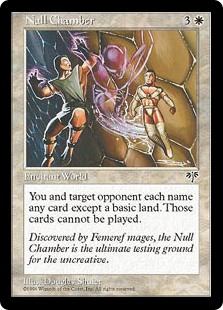Welcome back to Monday Magic! The series took a small hiatus during March so that I could focus on our first annual Laurel awards, which I am happy to report went over exceedingly well.
In the meantime, though, I’ve also had time to reflect on the nature of this column. When I started the series all those many months ago, my intent was for it to be a casual glide into the week by championing older and easily overlooked Magic cards which could be worthwhile in the Commander / EDH format, interspersed occasionally with other Magic-related topics.
While that underlying mission has never wavered, over time these pieces have gotten progressively longer and more in-depth than I originally envisioned. In recent months it’d gotten to the point where the size of the articles started reaching two or even three times the length of the original segment framework. Although that doesn’t inherently sound like much, when combined with the litany of other roles I have here at the CR, as well as a limited amount of time each week to accomplish all of them, the extra time and mental energy spent on extensive Monday Magic card spotlights had started to become a problem.
Having the last month off from these postings allowed me to step back and a) acknowledge that it actually was becoming problematic, as well as b) address how to rectify it. Monday Magic is a great way to briefly cover Magic-related topics by way of a weekly card suggestion, but it was never intended to become an extensive creative writing outlet. Which is what I started using it as.
Due to the multitude of site hats I currently wear, I often don’t have the means to devote towards many article ideas I would like to, Magic or otherwise, and until we reach the level of CR members necessary to provide the flexibility for me to so do, that isn’t likely to change anytime soon. (Such it is with a small crew and a growing site.) Yet that desire to do so started bleeding into Monday Magic, which in turn started affecting the timetables of things such as our game reviews, including causing delays or adding unnecessary stress.
In short, something had to give. And it was an easy choice.
Monday Magic isn’t going away. Rather, it’s just going to revert to the shorter article pieces that it always was supposed to be. Longer entries will still happen, I’m sure, but it will no longer be the norm. This will hopefully make these Monday morning pieces easier to consume while doing a better job highlighting the cards at the center of them.
To wit, let’s just jump right in. No time for change like the present.
Today we have: Null Chamber

Name: Null Chamber
Edition: Mirage
Rarity: Rare
Focus: Card Denial
Highlights: One of the things that makes multiplayer Magic so much different than dueling is that the board state is not binary. It is constantly changing, and the person generating the most threat can change constantly. To It also means that players must forge temporary arrangements or alliances to deal with those threats, injecting the whole idea of table politics into the game. Null Chamber is an extension of la table politique.
Although Meddling Mage was the first card that brought to prominence the concept of card nullification – preventing a specific card from being cast – Null Chamber actually predates its existence by five years. Indeed, such cards are not incredibly common. Only about a dozen or so cards with this effect exist (e.g Nevermore, Voidstone Gargoyle, Declaration of Naught, etc.), and they’re only seen regularly in control-style decks.
Because of their pinpoint nature, their presence is diluted in multiplayer games. Unlike typical multiplayer, however, they can still be quite effective in EDH as a way of locking out a specific card someone’s deck engine may hinge on, or if you’re being particularly mean about it, using it to prevent an opponent from casting their Commander entirely.
Aside from Null Chamber’s ability to prevent the playing of a nonbasic land (a corner case but an option nonetheless), Null Chamber trades the potential stinging effect by bringing politics into the mix. Null Chamber locks out not one but two named cards – with the catch that an opponent gets to choose one of them. This can be exceedingly handy in situations where you’re looking to make new allies or are in need of assistance addressing a particular threat. Choose your opponent and timing wisely.
A word of caution, though: if your deck runs a particularly nasty combo, or the deck it’s in has an intimidating Commander, it can easily backfire on you since your cards are fair game for the choosing too. You’ll want to bear that in mind.
Null Chamber is an ideal older gem to showcase: it’s the kind of card that at first glance doesn’t seem like it’d find a home in EDH but can actually prove quite effective if given the chance. And I can’t think of a better return to form criteria than that.
Keep an eye out for us to be regularly featuring other more accessible-but-worth-it Commander cards going forward. In the meantime, we’ll keep the light on for you.
![]()
You can discuss this article over on our social media!
Do you have a particular Commander card to suggest for us to shine a future Spotlight on? You can send suggestions to ryan@cardboardrepublic.com
